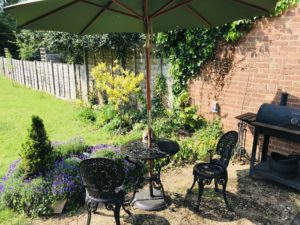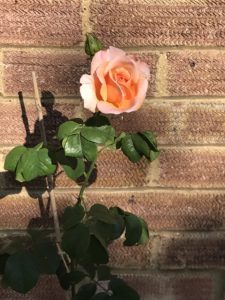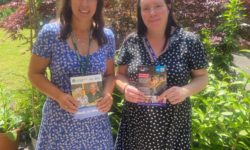HILS Nutrition & Wellbeing Visitor, Stuart, suffered the bereavement of his beloved four-legged friend, Dutch, over Christmas in 2022. Dutch loved spending time out in nature, so after burying him at the end of the garden, Stuart decided to channel his grief into gardening.

“So that Dutch wasn’t – shall we say, unattended – I decided to utilise the plot (his grave) by adding some herbs over the top. And it went from there, really. The pine tree at one end of the garden is actually my Christmas tree from 2022, which is when he passed away. I planted it there to remind me of him.”
Before joining the HILS Nutrition Team, Stuart studied Horticulture, Agriculture, and Environmental Sciences as well as training in Countryside Management, so the world of flora and fauna was not new to him. After burying Dutch, Stuart took everything he knew and decided that his back garden would become his new project, keeping him busy throughout this difficult time and bringing a little bit of structure and joy to daily life.
Dutch’s memorial garden blossomed into a fruitful adventure throughout 2023. Stuart uses herbs from the garden in his Sunday batch cooking, and his neighbours are keen to get their hands on his home-grown ingredients for their own recipes. “It’s a memorial garden first and foremost, but I’ve turned it into a kitchen garden. My 70-year-old neighbour is always pinching my strawberries over the fence! But she is more than welcome.”
To make things fun, Stuart set himself the challenge of collecting all the various types of individual plants. He’s already got four different types of sage, mint, and rhubarb, eight different fruit trees, and an infinite amount of berry variations. “You name it, I’ve got it”, he says.
Stuart connects his gardening efforts to his role as Nutrition & Wellbeing Visitor, “The earth is like a human body. It needs water and it needs nutrients. We can take care of our vegetable plots like we take care of ourselves.” Read on for his top tips for your own gardening adventure.
Stuart’s top tips for a flourishing garden

Start planning
Although you might be limited in terms of physical gardening activities due to gloomy winter weather, you can still make progress by planning. Make a list of what you’d like to grow and draw up a plan of your garden. Scribble your ideas onto paper and start imagining where you’d like to plant your herbs, flowers, fruit, and vegetables. Will you have separate sections, or mix things up? Get creative in time for spring.
Cover vegetables and bare soil
Covering your garden in the winter will suppress early spring weeds and help protect the beneficial microbes and insects living inside the garden from frost, while also preventing erosion from wind and snowmelt. By applying compost now (either as the cover or underneath another cover), the nutrients will break down over the winter and provide a healthy boost come spring.
Attract wildlife

Garden wildlife really needs your help in winter and there are lots of things you can do – find out how to help wildlife survive winter. You can help to feed garden birds and make your garden bee-friendly during the colder days. Lots of animals go into hibernation during the winter months, so if you’re setting fire to things or clearing out compost bins, take extra care not to disturb any creatures that may be hiding.
Get pruning
Winter is the main time to prune many types of fruit, including blackcurrants, apples, pears, autumn-fruiting raspberries, redcurrants, and gooseberries. It’s also a good time to tackle trees, shrubs, and roses. Find out more about what to prune in winter.
“Gardening has been incredible for my mental health. Not only do you have something to distract you from grief or worries, but you also end up with the produce of your hard work, which makes it all worth it. I advise my Nutrition & Wellbeing clients to get outside in the summer, and I’d love to help others with horticultural therapy in the future.”


